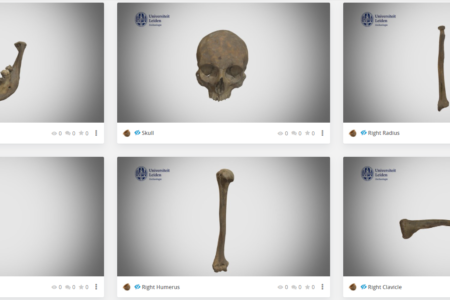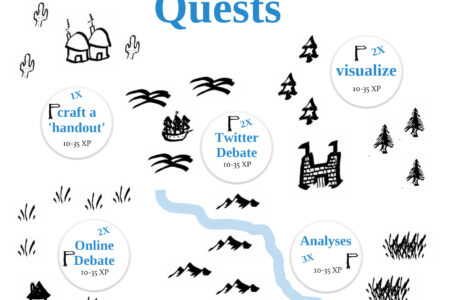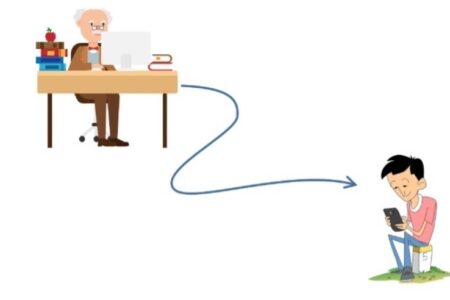Old New Normals
What will be the New Normal in university teaching? That is the theme of the annual LTA Teaching Festival – originally planned for January 27, now moved to June 2022. Before taking a look at the future in June, Jan Sleutels shares some views from the past. There have been New Normals before.
Fingerspitzengefühl
“Don’t they trust us any more?”, my colleague sighed. That was ten years ago, as we talked about the rule that oral exams should be recorded or witnessed by a second examiner. In earlier decades, old-fashioned orals had been quite usual. Not just in language training (where they are obviously needed) or thesis defence (where they are now slowly disappearing), but also in regular courses across the university, from psychology to history.
For many centuries, oral work was seen as more reliable than writing. In Plato’s Phaedrus, Socrates famously argued that writing is not fit for serious thinking. And even today there is something doubtful about writing. In writing, you can cloak your ignorance in stock phrases and hollow constructions, of your own or someone else’s making. That’s why we have Turnitin, although it doesn’t work against bullshit. But in an oral exam, you stand alone. Answer in your own words, or fall through.
Orals are now virtually obsolete. They smack of bias and subjectivity. Is credit given for knowledge or for agreeable company? Still, my personal experience is that orals work pretty well for testing a student’s knowledge and understanding. Orals have their own dynamics. You can pursue a line of thought with further questions, reformulate, enter into a discussion. You often know what the grade will be within ten minutes.
How does the examiner do it? Some would call it Fingerspitzengefühl, while others say it is mere fiddling. Today we want to be on the safe side, and fiddling is to be avoided at all costs. Exams must follow Dublin-proof protocols aiming for objectivity. Orals do not fit that image.
Changing landscapes
As a philosophy student in the 1980s, I took the dreaded exam in Modern Philosophy. The professor, who was hard of hearing, suddenly leaned over to me and shouted, “ARE YOU DEAF TOO?” I froze, but suddenly I realized what he meant. I was wearing a pair of glasses with strap cords, which the professor mistook for wires of a hearing aid. “No, just straps,” I explained. That broke the ice, and half an hour later I passed the exam.
Dutch novelist A.F.Th. van der Heijden once sat for that same exam in Modern Philosophy (Een gondel in de Herengracht, 1978). He had secretly taped all the lectures (which was strictly forbidden at the time). As he played the tapes over and over again, the contents of the lecture remained a mystery to him, but in the meantime, he picked up the professor’s idiom, his way of speaking, and even his tone of voice. “How will this go tomorrow?” he mused. The exam was oral. “The professor would ask a question and hear himself give the answer, while the student was only mouthing the words.” That would not go unnoticed.
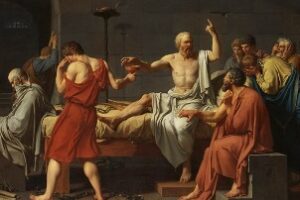

Were we wrong to trust orals in the past? I don’t think so. It’s just that the communication landscape has changed in the meantime, almost beyond recognition. New landscapes bring new ways of organizing and processing knowledge. They ask for new skills to be taught, trained and examined. Socrates was no doubt right in the 4th century BCE, but he would have been dead wrong today.
Over the past 20 years, the landscape has been changing faster than ever before. Books and chalkboards gave way to pdfs, powerpoints and video clips. Websites, blogs, vlogs, chats, Brightspace, Teams, Kaltura, the list is endless. Students and lecturers now spend a considerable part of the day in a digital world. The ways in which information is organized and processed are changing much faster than our ideas about teaching. Which makes me wonder how to keep up. Is writing still the best form of examination? Which skills can we expect our first-year students to have? Should we keep trying to turn our graduates into proficient writers?
Academic jetsam
My first office desk at Leiden University still held a former professor’s pencils, papers, staples and notes. Decennia worth of academic jetsam! Buried deep inside was a prospectus from the early 1970s. Prospectus is a big word: three pages, typed and stapled. The faculty’s teaching programme was a single page of announcements like, Prof. N.N. will lecture on analytical philosophy, Tuesdays 8-10 o'clock in room 6. Exams by appointment with the secretary; mention the books you want to discuss.


Fifty years ago, it seems, university teaching more or less organized itself. There was little need for support from system or structure. A couple of lecture rooms and labs, a card index for exam results, a typewriter for the secretary, an office for the professor. That pretty much sums it up. Everything else in teaching was content: the ideas, the theories, the discussions, the books, the lectures. And this sphere of content took care of itself in a way that was totally self-evident to all. Trying to regulate that sphere would undermine the professor's autonomy, and worse: it would completely disrupt the natural and smooth course of events. Everything would go wrong.
As a student in the 1980s, I witnessed the aftermath of ‘pure content’, and as a lecturer in the 1990s, I witnessed its demise, although I did not realize it at the time. Today we are convinced that things go wrong if they are not regulated, planned, supported and monitored by a system that keeps the content in check. As a result, we spend an alarmingly big part of our teaching time checking boxes and filling spreadsheets.
Old new normal
Part of the reason behind this change is a steep increase in student numbers, which for Dutch universities have tripled over the past fifty years. To cope with that growth without compromising the quality of teaching and learning, so the argument goes, universities had to introduce modern management systems. Teaching became a business division with targets, audits, marketing and accountability, Dublin descriptors and learning lines, student expectations and service levels. With the development of the Internet, especially over the past 10-15 years, teaching absorbed a wide range of digital systems as well, including tools like Usis, Brightspace, MyTimetable, FeedbackFruits, video portals and online assessment tools.
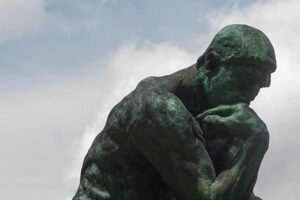

The carefree days of pure content are gone forever, and I am not nostalgic about them. The ‘old new normal’ has improved university teaching in many ways, quite apart from considerations of scale and efficiency. What stands out for me, is that it increased the transparency of our teaching and invited us to reflect on it. This is something the ‘old normal’ spectacularly failed to do. We are now encouraged to ask questions like, What do I teach, and why is that important? What do students need to learn, given the demands of modern society? How does my teaching fit in with the programme as a whole? Are students responding to my teaching methods? How can I improve my teaching?
I am quite satisfied with most of the new teaching systems (exceptions are Usis and MyTimetable), and thoroughly excited about the new digital tools that became available. But underneath my excitement, I sometimes have an uneasy feeling. Am I using the system, or is the system using me? Am I really adapting my teaching to fit the system, rather than have the system support my content? Weren’t the systems supposed to give me more time to spend on content?
© Jan Sleutels and Leiden Teachers Blog, 2022. Unauthorised use and/or duplication of this material without express and written permission from this site’s author and/or owner is strictly prohibited. Excerpts and links may be used, provided that full and clear credit is given to Jan Sleutels and Leiden Teachers Blog with appropriate and specific direction to the original content.



